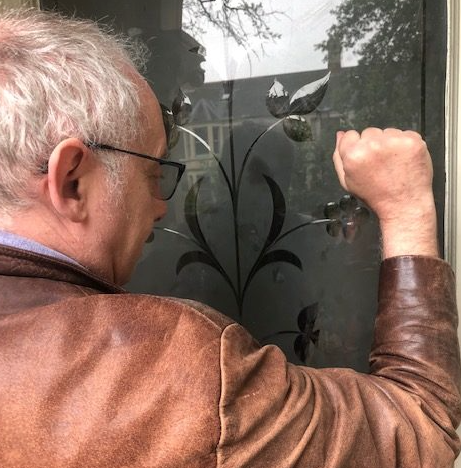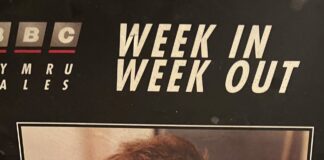- Round Robin - 19th February 2026
- Dark speak easy part one - 18th February 2026
- X marks the spot again - 17th February 2026
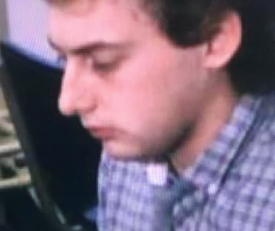
After 23 years with The BBC, and a 41 year journalistic career (when he was trained to use clear and simple language, avoiding jargon), our Editor, Welshman Phil Parry today looks on with horror, at how after a string of high-profile scandals in the giant corporation, criticism is now mounting of its cultural output when it apparently includes in the bracket shows like ‘Strictly Come Dancing’ and ‘Italian Grand Tour’ where two celebrities go to Venice.
I don’t know whether to laugh or cry.

Now it’s the turn of The BBC’s cultural output to be denounced, where executives are apparently extremely flexible about what actually constitutes ‘culture’, and it seems to include programmes like ‘Italian Grand Tour’ with Rylan Clark and Rob Rinder frolicking around Venice, as well as ‘Strictly Come Dancing’ because dance is (sometimes) involved.
The background is worrying too, with a 2020 report by the watchdog Ofcom stating that the corporation devoted fewer than 300 hours to arts, religion as well as education, and in 2023 arts spending was cut by 12 per cent.
 This puts into context condemnation of The BBC’s Director General (DG) Tim Davie when he said he was determined to “reinforce our commitment to arts and culture”. Private Eye (PE) has declared: “Perhaps Davie feared criticism from the new Downing Street regime, but his efforts to persuade everyone the BBC loves culture was as questionable as his claim that the current cultural output is 28,000 hours”.
This puts into context condemnation of The BBC’s Director General (DG) Tim Davie when he said he was determined to “reinforce our commitment to arts and culture”. Private Eye (PE) has declared: “Perhaps Davie feared criticism from the new Downing Street regime, but his efforts to persuade everyone the BBC loves culture was as questionable as his claim that the current cultural output is 28,000 hours”.
Don’t forget this comes on the back of all those controversies, and as I was there for many years, again I feel I have a right to list them:
We have had Amanda Abbington/Giovanni Pernice on ‘Strictly Come Dancing’, which is, of course, SO cultural. There has also been the bad headlines about the One Show and Match of the Day (MotD) presenter Jermaine Jenas, the Gary Lineker business, the Huw Edwards affair, and the Jimmy Savile scandal (the full extent of which has only emerged relatively recently).
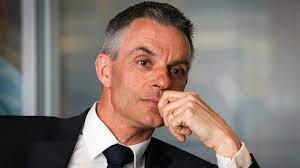
All of these incidents have prompted front page news about The BBC in UK papers. We’ll start with the information about Ms Abbington. The BBC says it has now assessed and “upheld some, but not all” of her complaints about her time on Strictly, after she pulled out of the show last year and claimed later that there was a “toxic environment”, as well as that she had been subject to “inappropriate, mean, nasty bullying”.

In saying sorry, the huge corporation proclaimed: “We have assessed the complaints and we have upheld some, but not all, of the complaints made. We want to apologise to Amanda Abbington and to thank her for coming forward and taking part. We know this would not have been an easy thing to do”. It also said in the apology statement that The BBC expects “…very high standards…”, so critics (including me) are entitled to ask why the previous scandals happened in the first place.
 Mr Jenas, too, faced claims of ‘inappropriate behaviour’ and was sacked from The BBC over allegedly sending ‘unsolicited’ texts to junior members of staff. Reports have claimed that one female worker received unsolicited communications via text from him – they were supposedly ‘flirty’. Others then came forward according to The Sun. However, the source added there was “no suggestion of illegality” on Mr Jenas’s part.
Mr Jenas, too, faced claims of ‘inappropriate behaviour’ and was sacked from The BBC over allegedly sending ‘unsolicited’ texts to junior members of staff. Reports have claimed that one female worker received unsolicited communications via text from him – they were supposedly ‘flirty’. Others then came forward according to The Sun. However, the source added there was “no suggestion of illegality” on Mr Jenas’s part.
There is no way of knowing if this alleged message sending had been going on for some time or was very recent, but what IS certain is that The BBC was keen to paint a picture of decisiveness. An internal source who backs managers there told The Times: “We investigated him immediately and fired him pretty fast. There are no excuses for anyone in power abusing their positions. He’s a man in power messaging some runner”. Mr Jenas made an extraordinary statement about his sacking on radio with talkSPORT.
Others, though, are less happy. One Welsh former senior executive said to The Eye: “The BBC is attempting to display decisiveness after the Huw Edwards & Savile scandals to help restore its public image. It’s cosmetic. He’s relatively small fry compared to Lineker…”.
 The former executive’s comment alludes to another of the controversies which happened on Mr Davie’s watch – about Mr Lineker. He had posted a tweet, apparently attacking the UK Government’s policy towards refugees, however his supporters (including Mr Jenas) proclaimed that this was from his personal account, and carpeting him undermined the concept of free speech.
The former executive’s comment alludes to another of the controversies which happened on Mr Davie’s watch – about Mr Lineker. He had posted a tweet, apparently attacking the UK Government’s policy towards refugees, however his supporters (including Mr Jenas) proclaimed that this was from his personal account, and carpeting him undermined the concept of free speech.
He was then allowed back on air, but this apparent U-turn provoked a storm of criticism, and politicians as well as sports stars poked fun at the corporation over it.
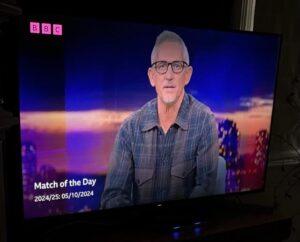
Some Tory MPs were furious at the decision to bring Mr Lineker back, saying that it gave him “carte blanche” to state what he liked on social media, despite Mr Davie insisting that he would “abide by the editorial guidelines”.
An ‘independent review’ was to look into the use of social media by staff, although to critics this looked like meaningless twaddle to cover up the fact that managers had messed up.
Meanwhile Mr Savile had sexually abused hundreds of children and women at the height of his fame. It is now believed he preyed on around 500 vulnerable victims as young as two years old at institutions including The BBC’s broadcasting studios, 14 hospitals and 20 children’s hospitals across England.
Obviously this abuse took place before Mr Davie took over as DG, but the extent of it has only come out recently so he has to take responsibility.

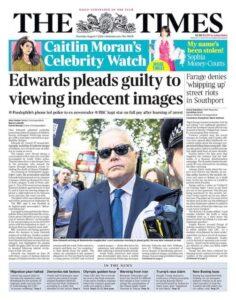 This came amid the astonishing business about Edwards, which was very much with Mr Davie in position. He was given a six month jail sentence last month, suspended for two years. Edwards had moving images of a child aged between seven and nine, and 41 photographs – seven category A images in levels of criminality, 12 category B pictures, and 22 category C. The category A images – the most serious kind – were mostly of children aged 13 to 15.
This came amid the astonishing business about Edwards, which was very much with Mr Davie in position. He was given a six month jail sentence last month, suspended for two years. Edwards had moving images of a child aged between seven and nine, and 41 photographs – seven category A images in levels of criminality, 12 category B pictures, and 22 category C. The category A images – the most serious kind – were mostly of children aged 13 to 15.
Yet Mr Davie thought they had done well. He defended his corporation’s handling of the controversy, when it paid Edwards hundreds of thousands of pounds even though it knew he had been arrested on child pornography charges.
The BBC were also to keep the BAFTAs won for Royal coverage fronted by Edwards, and individual awards he received would ‘remain under review’.
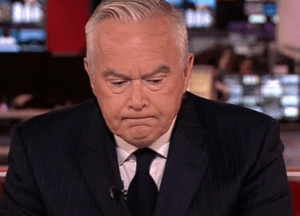
But staff inside the organisation were distressed. One whistleblower said they were “disappointed” not to have heard more about an internal inquiry’s progress, a further critic said that it felt like “things have been swept under the carpet”.
The background is unbelievable. On a different issue, Edwards was suspended in July 2023 after reports in The Sun said he had paid a young person for sexually explicit images. More is now known about his behaviour. Edwards’ admission of what he did made the front page of almost every single UK newspaper.
There has also been consternation about why he was a hero to some in the Welsh nationalist or independence communities. One leading Public Relations (PR) and marketing executive who wished to remain anonymous, told The Eye: “It has always seemed incredible to me, and now this just emphasises it. In the past we have even had Welsh nationalist or independence clients wanting to put Huw Edwards’ face on their products!”.
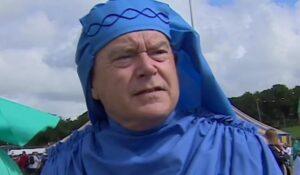
In one announcement on Twitter/X Edwards highlighted (ironically): “The wacky world where Wales was never a nation and Pembrokeshire is the heartland of… Plaid Cymru. Help!”. The picture he attached underneath it, was of protesters carrying Welsh flags aloft with a placard of END LONDON RULE clearly visible near the centre of the photograph.
He was ordered to drop a post of himself in front of a Welsh flag, which he proclaimed (once more ironically) was a “backdrop for @BBCNews at Ten”, and responded: “Gutted my pro-flag tweet has been cut down in its prime. By order. But it will be back tomorrow – by popular demand. Meanwhile enjoy this magnificent flag – one of my favourites. Hashtag SixNationsRugby Hashtag FRAvWAL” – with a series of emojis included.
His remarks, though, were not met with wild acclaim by the leader of the Welsh Conservatives in the Welsh Parliament/Senedd Cymru (WP/SC) Andrew RT Davies, who has said on Twitter/X that The BBC was: “Employing presenters who openly mock… (Britain)… Ridiculous!”, and linked it to the ‘Gutted’ post.

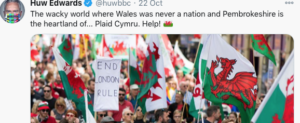 He has ‘liked’ a tweet declaring that he should be “President of an Independent Cymru”, apparently flying in the face of the rules on impartiality (which Mr Davie has endorsed), and there was also a call on the internet for Edwards to be knighted because of his presentation of a Royal funeral.
He has ‘liked’ a tweet declaring that he should be “President of an Independent Cymru”, apparently flying in the face of the rules on impartiality (which Mr Davie has endorsed), and there was also a call on the internet for Edwards to be knighted because of his presentation of a Royal funeral.
He attacked a critique of the break-up of the UK by celebrated historian and journalist Max Hastings. Edwards tweeted that there were “errors”, and after Edwards’ diatribe the website Nation.Cymru (NC) (which is supported by the taxpayer unlike The Eye) published a ‘news’ piece saying: “Huw Edwards slams former Telegraph editor for anti-Welsh language article”, and it has ‘reported’ many ‘stories’ about his exploits. For example, following a remark about Welsh nationalist party Plaid Cymru (Plaid), it ran a ‘story’ that: “Broadcaster Huw Edwards has protested the BBC’s new rules on using social media by unleashing a cascade of Welsh flags”.
 The exposure of Edwards caused a huge storm when it emerged that he had been paid between £475,000 and £479,999 in the 2023-24 financial year, making him the broadcaster’s third-highest-paid presenter overall.
The exposure of Edwards caused a huge storm when it emerged that he had been paid between £475,000 and £479,999 in the 2023-24 financial year, making him the broadcaster’s third-highest-paid presenter overall.
He was merely ASKED to give some of it back. In a letter to staff the BBC Chair Samir Shah said that Edwards had “behaved in bad faith” (surely an under-statement!), saying that the corporation believed he had taken his salary despite knowing he was to plead guilty to the offences.

Mr Davie told the House of Lords (HoL) Communications and Digital Committee (CDC) lamely: “The money should be returned and we made the request…we do expect to make progress and get an answer. We’ve made the formal request and I can’t go into too much detail but discussions are under way”.
Edwards, formerly The BBC’s most high-profile newsreader, continued to earn his salary for FIVE months after he was arrested on three counts of making indecent images of children, during which time he was paid more than £200,000.
He had allegedly given £35,000 to a teenager in exchange for the sexually explicit images, and when he was finally ‘outed’ by his wife a news item about it stated: “Vicky Flind, the wife of news reader Huw Edwards, has named him as the BBC presenter facing allegations over payments for sexually explicit images in a statement issued on his behalf”.
Harmful claims then emerged about Edwards’ actions generally at the BBC, with it being claimed that he had sent ‘menacing’ texts to one individual, and further allegations emerged following the original ones made in The Sun (the paper said it had a dossier of his activities, but has chosen not to publish).

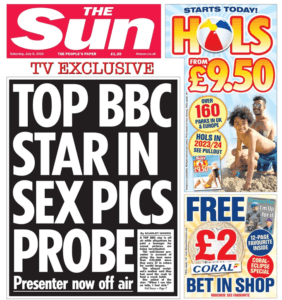 He was also accused of sending inappropriate messages to BBC employees (there are perhaps echoes here of what Mr Jenas is alleged to have done!). According to Newsnight, one current staff member claimed they were contacted on social media by him, and the messages left them feeling uncomfortable as well as awkward. The messages were reportedly suggestive in nature, appeared to be flirtatious, and referred to the appearance of Mr Edwards’ colleague. “There is a power dynamic that makes this inappropriate”, the staff member said. Another BBC employee alleged that Mr Edwards had also sent them a private message on social media which commented, too, on their appearance and gave them a “cold shudder”.
He was also accused of sending inappropriate messages to BBC employees (there are perhaps echoes here of what Mr Jenas is alleged to have done!). According to Newsnight, one current staff member claimed they were contacted on social media by him, and the messages left them feeling uncomfortable as well as awkward. The messages were reportedly suggestive in nature, appeared to be flirtatious, and referred to the appearance of Mr Edwards’ colleague. “There is a power dynamic that makes this inappropriate”, the staff member said. Another BBC employee alleged that Mr Edwards had also sent them a private message on social media which commented, too, on their appearance and gave them a “cold shudder”.
During the days in which Edwards went unnamed as the presenter at the centre of the scandal, the publicist and strategist Mark Berkowski also used a metaphor I have employed, and told Times Radio: “We’ve got a situation where it’s an ongoing car crash and the BBC is so glacial about how they’re dealing with this, because this is a 21st century problem”,
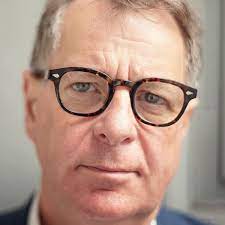
David Keighley, the former BBC news producer and director of News-watch, spoke of “reputational damage” to the man’s colleagues.
Journalists who covered the extraordinary incident, have apparently emphasised criticism that The BBC effectively clammed up about it. For instance, one Sky News journalist said at the time: “The fact all of us broadcasters have asked, have put in requests again and again to speak to the director general, and the fact that he has only given an interview to his own people is not a good look for the BBC”.
Yet senior executives seemingly took a different view. During a pre-arranged HoL committee hearing about a week afterwards, Mr Davie, said: “We have been in touch with the complainant”, and that due to the “history of this industry… we should all be concerned and appropriately diligent around the abuse of people in powerful positions”. As the Edwards issue came hard on the heels of the controversy about Mr Lineker, Mr Davie’s position now looks increasingly untenable.
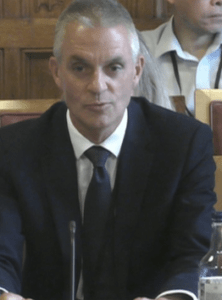
In that hearing he sat alongside the then acting chairwoman, Dame Elan Closs Stephens (who, like Edwards, is from Wales). She and Mr Davie were forced to answer important questions about the corporation’s attitude during the affair, following suggestions that it did not properly investigate the original complaint. Dame Elan told peers that despite “huge pressure” to name Edwards, the corporation “had a duty to act with some calm and rationality in the face of lack of rationality and lack of calm”. She was BBC chair for almost all of the period in question, and clearly she remains untarnished as one of the ‘great and good’ – she has been appointed to the Hay Festival.
Don’t forget the incredible Jay Blades episode either – again when Mr Davie was at the helm.
The Repair Shop star was accused of illegal acts in relation to his estranged wife, with the allegations including physical and emotional abuse, according to court documents. He appeared at Kidderminster Magistrates’ Court and was bailed until another court appearance.

West Mercia Police (WMP) said he was charged after they were called to an address earlier in the year, following an Instagram post by Lisa Zbozen. A repeat of David & Jay’s Touring Toolshed was removed and The BBC will not show any programmes in which he features.
Perhaps managers thought this was a shame because they might have been able to include them in The BBC’s cultural output as they involved old things…

The memories of Phil’s astounding, decades long award-winning career in journalism (including his many years at the BBC) as he was gripped by the rare neurological disabling condition Hereditary Spastic Paraplegia (HSP), have been released in a major book ‘A Good Story’. Order it now.
Tomorrow – why the kind of investigative journalism pursued by Phil is playing a key role in protecting innocent people from crooks and fraudsters, as we receive yet another message of support, and new details emerge about one of the countless journalistic organisations which are providing crucial intelligence to the Ukrainian authorities.








